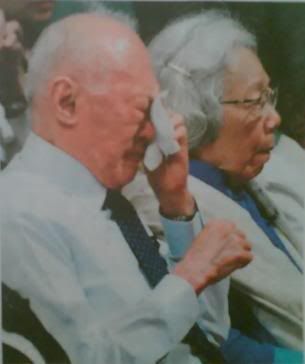Coffeeshop Chit Chat - Breaking News: MM Lee had surgery! Subscribe
From: kojakbt22 12:35 am
To: ALL (1 of 13)
3184.1
Minister Mentor Lee has minor surgery
Posted: 30 November 2008 1506 hrs
SINGAPORE: Minister Mentor Lee Kuan Yew had a minor surgery to implant a cardiac pacemaker on Saturday.
A statement from the Prime Minister's Office says the surgery was performed because Mr Lee had been experiencing symptoms of cardiac arrhythmia (that is irregular heart rhythm), which showed up with his atrial flutter on 14 September.
Mr Lee is recovering from the surgery and is expected to be discharged from the hospital on Monday, said the statement.
His doctors have agreed to and will accompany him on his trip to Hong Kong from 1-3 December to have a dialogue session with former US President Bill Clinton at his Clinton Global Initiative (CGI) Asia Meeting.
[email protected]
Options Reply
From: kojakbt22 12:39 am
To: kojakbt22 (2 of 13)
3184.2 in reply to 3184.1
http://en.wikipedia.org/wiki/Cardiac_arrhythmia
Cardiac arrhythmia (also dysrhythmia) is a term for any of a large and heterogeneous group of conditions in which there is abnormal electrical activity in the heart. The heart beat may be too fast or too slow, and may be regular or irregular.
Some arrhythmias are life-threatening medical emergencies that can result in cardiac arrest and sudden death. Others cause aggravating symptoms such as an abnormal awareness of heart beat (palpitations), and may be merely annoying. Others may not be associated with any symptoms at all, but pre-dispose toward potentially life threatening stroke or embolus.
Some arrhythmias are very minor and can be regarded as normal variants. In fact, most people will sometimes feel their heart skip a beat, or give an occasional extra strong beat - neither of which is usually a cause for alarm[1].
The term sinus arrhythmia refers to a normal phenomenon of mild acceleration and slowing of the heart rate that occurs with breathing in and out. It is usually quite pronounced in children, and steadily lessens with age. This can also present during meditation breathing exercises that involve deep inhalings and breath holdings patterns.
.
.
.
Some arrhythmias do not cause symptoms, and are not associated with increased mortality. However, some asymptomatic arrhythmias are associated with adverse events. Examples include increase in risk of blood clotting within the heart, and also an insufficient amount of blood is transported to the heart because of weak heart beat, and thus increase the risk of embolisation and stroke, or increase in the risk of heart failure, or increase in the risk of sudden cardiac death.[email protected]
From: kojakbt22 12:35 am
To: ALL (1 of 13)
3184.1
Minister Mentor Lee has minor surgery
Posted: 30 November 2008 1506 hrs
SINGAPORE: Minister Mentor Lee Kuan Yew had a minor surgery to implant a cardiac pacemaker on Saturday.
A statement from the Prime Minister's Office says the surgery was performed because Mr Lee had been experiencing symptoms of cardiac arrhythmia (that is irregular heart rhythm), which showed up with his atrial flutter on 14 September.
Mr Lee is recovering from the surgery and is expected to be discharged from the hospital on Monday, said the statement.
His doctors have agreed to and will accompany him on his trip to Hong Kong from 1-3 December to have a dialogue session with former US President Bill Clinton at his Clinton Global Initiative (CGI) Asia Meeting.
[email protected]
Options Reply
From: kojakbt22 12:39 am
To: kojakbt22 (2 of 13)
3184.2 in reply to 3184.1
http://en.wikipedia.org/wiki/Cardiac_arrhythmia
Cardiac arrhythmia (also dysrhythmia) is a term for any of a large and heterogeneous group of conditions in which there is abnormal electrical activity in the heart. The heart beat may be too fast or too slow, and may be regular or irregular.
Some arrhythmias are life-threatening medical emergencies that can result in cardiac arrest and sudden death. Others cause aggravating symptoms such as an abnormal awareness of heart beat (palpitations), and may be merely annoying. Others may not be associated with any symptoms at all, but pre-dispose toward potentially life threatening stroke or embolus.
Some arrhythmias are very minor and can be regarded as normal variants. In fact, most people will sometimes feel their heart skip a beat, or give an occasional extra strong beat - neither of which is usually a cause for alarm[1].
The term sinus arrhythmia refers to a normal phenomenon of mild acceleration and slowing of the heart rate that occurs with breathing in and out. It is usually quite pronounced in children, and steadily lessens with age. This can also present during meditation breathing exercises that involve deep inhalings and breath holdings patterns.
.
.
.
Some arrhythmias do not cause symptoms, and are not associated with increased mortality. However, some asymptomatic arrhythmias are associated with adverse events. Examples include increase in risk of blood clotting within the heart, and also an insufficient amount of blood is transported to the heart because of weak heart beat, and thus increase the risk of embolisation and stroke, or increase in the risk of heart failure, or increase in the risk of sudden cardiac death.[email protected]




